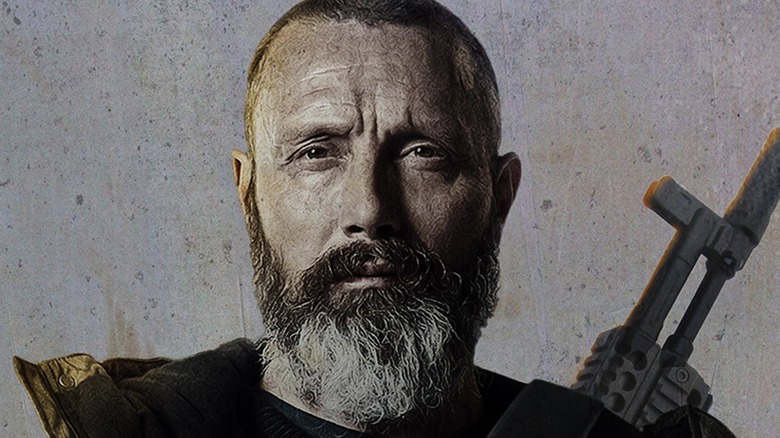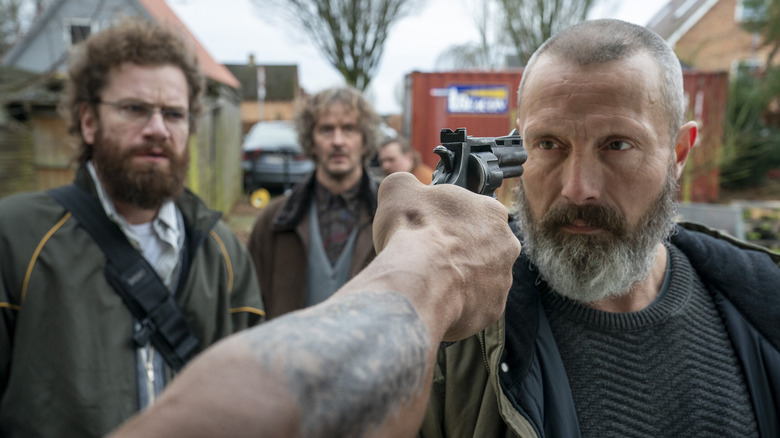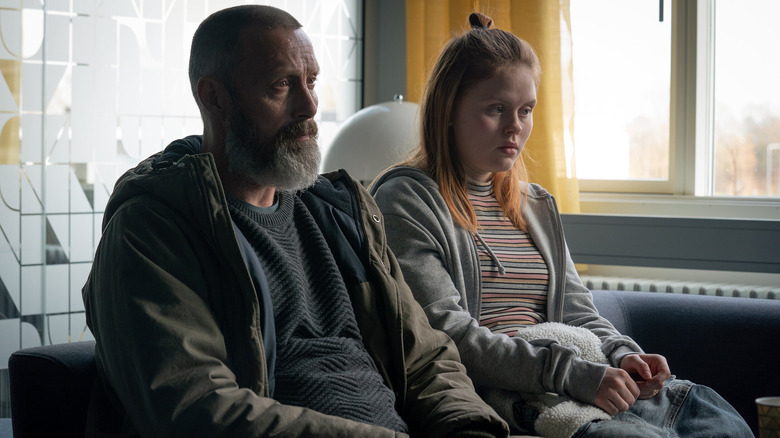Riders Of Justice Review: The Other Side Of Vengeance
In Hollywood, Mads Mikkelsen is a unique performer primarily typecast as a specific type of villain. Whether it's NBC's "Hannibal" series or "Casino Royale," Mikkelsen is a man who so naturally embodies menace that he's rarely seen through any other lens. But in his native Denmark, he's an actor given the space to display a wider range of onscreen emotion. His heart wrenching turn in Thomas Vinterberg's "Another Round" is centrally responsible for that picture winning Best International Film at this year's Oscars.
Now he's back in Anders Thomas Jensen's "Riders of Justice," a tragicomic meditation on grief masquerading as a brusque revenge thriller. As usual, he is the absolute best part of the film, with his singular presence and gift for nuance driving its most affecting moments.
On the surface, the film looks like Mikkelsen getting his Liam Neeson on, as "Taken" has long been shorthand for "movie about an older guy with military training hunting those who endanger his loved ones." Mikkelsen plays Markus, a soldier who leaves Afghanistan when his wife dies in a freak train explosion, leaving their daughter Mathilde (Andrea Heick Gadeberg) motherless and alone. The pair struggle in their grieving, neither able to fully engage with the other over this great loss.
But when Markus receives information to suggest his wife's death wasn't an accident at all, that there could ultimately be someone responsible for what happened on the train? Suddenly, his emotional paralysis turns into righteous fury, embarking him on a potentially ruinous quest fill this gaping void with the only thing he truly knows how to do — shedding blood.
Use your words, Markus...
Action films typically create problems that can easily be solved by the liberal application of well-placed violence. That's what makes them fun. In real life, we encounter issues that are too complex to resolve simply, so there's something to be said for living vicariously through some fictional badass fixing things with his fists, his feet, or a big-ass gun. But Jensen's script takes the long way around to this setup, introducing us to a host of characters whose particular skillsets are suited for one specifically convoluted scenario, one that can only be rectified through their combined willpower.
Markus is on an extended tour in Afghanistan and unable to connect with his family on even the best of days, so losing his wife only serves to highlight how little he truly knows his daughter, how ill-equipped he is communicate the way her Gen-Z hyper-sensitive boyfriend does about emotions and feelings. He's too much of a blunt force object for a task so delicate.
Similarly, Otto and Lennart (Nikolaj Lie Kaas and Lars Brygmann) are recently terminated mathematicians whose obsession with statistics and algorithms prove utterly useless to the company that contracts them. But Otto, another survivor of the train incident that took Markus' wife, sees too many odd details in the circumstances of the tragedy to accept that it was merely an accident.
Their scientific reasoning mirrors Mathilde's own path of acceptance, obsessing about the sequence of events that led to her losing her mother, papering her bedroom walls with Post-It notes outlining every decision that placed them on that train on that day, including her bicycle theft that sets everything into motion.
In this way, the film's second act explores the titular Riders of Justice, a gang Otto believes engineered what happened on the train to assassinate a former member who was set to testify against them in court. Otto's rationale hinges on the deceased suffering from OCD, thus always choosing the same seat on the train, a mysterious man exiting the train right before the explosion and tossing away an uneaten lunch, and that same man's face matching facial recognition scans of a potential bomb maker linked to the gang.
It sets into motion an exciting and engaging revenge campaign, with Markus' gifts for violence blending well with Otto and his friends' ability to hack systems and gather intel. Adding the computer specialist Emmenthaler (Nicolas Bro) to the mix, Markus' new friends come off like the Lone Gunmen from "The X-Files" supporting him in his pursuit of justice while pretending to be crisis therapists so Mathilde doesn't know her father is plotting a tactical operation from their barn.
For a time, it proves a thrilling diversion from the inescapable morass of their suffering. Everyone involved is able to hide behind the reassuring notion of causality, of big data's ability to explain away the tragic coincidences and unexplained disasters of life. The viewer, too, has no difficulty accepting this reading of reality because, well, that's how revenge thrillers work! It doesn't matter if the winding road to the truth has too many convenient and difficult to believe turns, because we the audience expect such a thorny path to lead to bloody and hard-earned salvation.
Why question a suspiciously fascinating plot if it allows us to watch Mads Mikkelsen snap dudes' necks and shoot up SUVs full of enemy combatants?
It takes a village...
It's not so much that the trailers for "Riders of Justice" are lying to you, necessarily. If you go out to see this film solely to watch Mikkelsen murk a bunch of dudes, fret not. There's no false advertisement in that department. But without delving too deep into spoiler territory, this isn't a movie that sets up a series of satisfying dominoes to topple only to arrive at one final boss whose grisly death leaves viewers comforted by the knowledge that evil has been defeated. Jensen's film has other aims.
There's a moment in the middle of the film when Mathilde's boyfriend is reacting to Lennart's curious shenanigans under the guise of being a crisis counselor, his therapeutic façade seeming stranger and stranger. The young man turns to Markus and posits that it's the results that matter, never mind the methods. This is ultimately a movie about a father and daughter coming to terms with an untimely death and finding a way forward without the glue that always kept them together. The circuitous route they take to finding that peace is littered with violence and carnage, but that isn't where their catharsis lies.
Instead, Markus and his newfound friends' mission, through some unfortunate revelations, slowly transforms from a makeshift commando unit into an earnest found family. The darkly comic approach Jensen takes to this arc, in a mainstream Hollywood action movie, might have its jokey tone cranked to 11, leaving little room for the subtlety and grace this slow process of growth actually displays. He finds within a well-worn thriller structure these adorable little pockets of life, creating the breathing room necessary for Mikkelsen and his co-stars to truly portray the complexity of grief and the difficulty in gaining mental wellness, through touching moments that are often as distressing as they are hilarious.
The result is a film that fans the flames of bloodlust for spectacle and provides audiences with entertaining little diversions of bullet spray, but one whose lasting impact is nowhere to be found in its most chaotic set pieces. Rather, it's a picture that finds a way to connect to the viewer through far more innocuous but impactful images. It won't be Mikkelsen looking like an absolute beast mowing down gangsters that sticks in the mind long after the credits. It'll be the strength required to show him at his weakest moment actually breaking down and crying, perhaps for the first time in his entire life. It'll be in the poetic shots of a bicycle at Christmastime, tying the entire bloody journey together in an evocative statement on the cyclical and unknowable nature of fate.
Quite frankly, that's a lot more than you may have bargained for from this film's marketing alone. And don't we love the surprise and delight of a genre programmer overdelivering on pathos?


